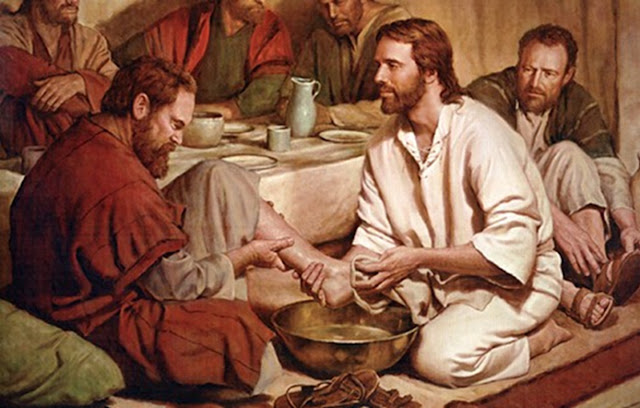Embodying Jesus' Humble Service
In John 13:16-20, Our Lord performs an act of profound humility that reverses the expected order of the world. "Truly, truly, I say to you, a servant is not greater than his master; nor is he who is sent greater than he who sent him." In this sacred moment before the institution of the Eucharist, Jesus Christ assumes the position of the lowest household servant by washing His disciples' feet. This gesture is not merely symbolic but sacramental, revealing the very heart of God who empties Himself for love of His creatures. The King of Kings kneels before sinful men, teaching us that authentic authority in the Kingdom of God manifests as self-giving service. When we contemplate this mystery, we recognize that our Lord's actions at the Last Supper prefigure His ultimate act of service - His sacrifice on Calvary.
This washing of feet carries profound implications for how we understand the ministerial priesthood and our common baptismal priesthood. When Jesus says, "If you know these things, blessed are you if you do them," He establishes service as the fundamental attitude of Christian life. The apostles, the first priests of the New Covenant, are being formed in this moment to understand that their sacred office exists not for personal glory but for sacrificial service to the Body of Christ. Similarly, all the faithful are called to this same disposition of heart. The liturgical reenactment of the foot washing on Holy Thursday reminds us that the Eucharist and Christian service cannot be separated - they are two expressions of the same divine love that gives without counting the cost.
Jesus' words about Judas's betrayal - "I tell you this now, before it takes place, that when it does take place you may believe that I am He" - reveal another dimension of this sacred episode. Even knowing that Judas would betray Him, Our Lord washed his feet with the same tender care shown to the others. This demonstrates the universal scope of Jesus Christ's redemptive love, offered even to those who reject it. Furthermore, it illustrates that divine foreknowledge does not negate human freedom. The Lord respects our dignity as free creatures, even when we use that freedom to wound Him. In washing Judas's feet, Jesus demonstrates that authentic Christian service does not discriminate between the worthy and unworthy, but is offered freely to all, mirroring the Father's love that "makes his sun rise on the evil and on the good."
Finally, Jesus declares, "He who receives anyone whom I send receives me; and he who receives me receives him who sent me." This statement illuminates the sacramental principle underlying the Church's mission throughout history. Those who minister in Jesus Christ's name - particularly through the sacramental priesthood in an unbroken line from the Apostles, make Christ Himself present. When we receive the sacraments from the hands of Christ's ministers, we receive Jesus Christ Himself. When we serve others in Jesus' name, Jesus serves through us. This mystical identification between Jesus Christ and His Church is the foundation of all authentic Christian service. In humbling ourselves to serve as Jesus served, we paradoxically participate in the divine life, becoming instruments through which God's redemptive love continues to work in the world. Our acts of service, united with Jesus' perfect sacrifice, acquire eternal significance.
©2025 James Dacey Jr.



